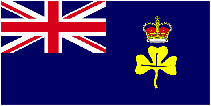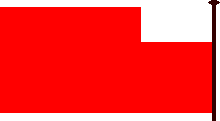- SHADES OF TINCTURE
- See Appendix III.
- SHAMROCK
- See trefoil.

Ensign of the Royal North of Ireland Yacht Club (Graham Bartram)
- SHARK ALERT (or ALARM) FLAG
- See beach flag.


Shark Alert Flags, Hong Kong (fotw) and Australia (CS)
Please note that the Australian shark alert warning is the
same as Flag Uniform in the International Code of Signals where the meaning is 'you are
running into danger'.
- SHEAVED BLOCK
- A nautical term for a pulley, the sheave being the revolving grooved wheel
within the block and on which the halyard runs (see also
Appendix I and
halyard).
- SHAHADA
- A term (meaning testimony or approval in Arabic) that refers to the Islamic
statement of faith which appears on several Arab flags, and is usually seen thereon
in its shortened form - La allah illa Allah (wa) Muhammed rasulu Allah or There
is no Deity but God (and) Muhammed is Gods messenger (see also
takbir).
![[Shahada]](../images/v/vxt-d299.gif)
National Flag of Saudi Arabia (Graham Bartram)
Please note that the full term reads Ashhadu Alla
Ilaha Illa Allah Wa Ashhadu Anna Muhammad Rasulu Allah or "I bear witness that
there is no Deity other than Allah and that Muhammad is his servant and Messenger".
Please note also, that the use of a sacred text on the Saudi flag has resulted
in many restrictions as to its use and appearance.
- SHIELD
- 1) In heraldry the shield (varying in detail and based on an item of defensive armour)
is the basic element of all armorial bearings, and forms the field upon which the main
heraldic charges are displayed. It is always blazoned first, and is often shown alone
an escutcheon (see also
Appendix IV,
armorial bearings,
coat of arms and
escutcheon).
- 2) On flags as above, but the charge or charges displayed need not be heraldic
in origin, and (and sometimes shown with weapons) is often said to symbolize a willingness
to defend the country.
![[Kenya]](../images/v/vxt-d562.gif)
National Flag of Kenya (fotw)
![[shield shapes]](../images/v/vxt-d562a.gif)
Some Examples of Shield Shapes (CS)
- SHIELD-SHAPED
- A form of flag, now obsolete, where the fly is rounded and comes to a point - as on the base of some shields
(see also engrailed fly and shield above).
![[Shield shaped]](../images/v/vxt-d301.gif)
- SHIPPING (or SHIPPING COMPANY) HOUSE FLAG
- See house flag 1).
- SHOULDER PATCH
- See flag patch.
- SIGNAL FLAG
- Any of a number of straight-sided flags as well as various triangular and
squared-ended tapered pennants, of a generally simple, recognized design which,
when flown singly or together are used to transmit messages in an established
code, especially at sea - see
'numeral flag' and
'numeral pennant' (also
'hoist 2)', flags 1),
'International Code of Signal Flags',
'dressing ship',
'church pennant',
repeating frigates,
yeoman of signals.)
- SIGNAL GROUP
- See hoist 2).
- SIGNAL HOIST
- See hoist 2).
- SIGNIFER
- The bearer of a 'signum' (see signum below).
- SIGNUM (or SIGNA)
- 1) Generically and in the plural (signa) all the vexilla, flags and vexilloids used by the ancient Roman army
(see also draco, eagle 2),
flammula, vexilloid 2) and
vexillum).
- 2) Specifically and in the singular (signum) the vexilloid of a maniple, or subdivision of a Roman legion
(see also vexilloid 2)).
- 3) The similar vexilloids of auxiliary units.
Please note that a maniple was one- third of a cohort (which was itself one-tenth
of a legion) and in the first Century AD a standard maniple would consist of about 160 men.
Also please note that signum is the Latin for sign as semeion was in classical Greek
(see also semeion).
- SILKS
- See company colours.
- SIMPLE BICOLOUR
- See bicolour 2).

National Flag of Ukraine (fotw)
- SIMPLE PALL
- See pall.
- SIMPLE PILE
- See pile.
- SIMPLE TRIBAND
- See triband 2).

National Flag of Peru (fotw)
- SIMPLE TRICOLOUR
- See tricolour 2).

National Flag of Italy (fotw)
- SINISTER
- The heraldic term for the left hand side of a flag or shield from the point
of view of the bearer, or the right hand side from the point of view of an observer
(see also dexter).
- SINISTER HOIST
- The term used when a flag is depicted with its hoist to the observers right in
the Arabic tradition but see sinister above (also
hoist 1),
obverse and
reverse).

National Flag of Abu Dhabi (fotw)
- SKULL AND CROSS-BONES
- See jolly roger.
- SLEDGE (or SLEDGING) FLAGS
- In UK and some other usage now largely obsolete, the flags (of varying design) that were
flown from the sledges of several polar expeditions in order to make them more visible from
a distance and for reasons of esprit de corps.
![[1875 North Pole expeditionary flag]](../images/v/vxt-d597.gif)
![[Shackleton 1914 Antarctic expeditionary flag]](../images/v/vxt-d597a.gif)
From left: Flag used by the 1875 Expedition to the North Pole
(fotw); Flag used on Ernest Shackleton's 1914 Expedition to the Antarctic (fotw)
- SLEEVE
- 1) See heading.
- 2) Especially of an indoor flag, parade flag or military colour, a tube of
material at the hoist into which the staff is inserted (see also
indoor flag,
parade flag,
colour 2),
tab and staff 2)).
Please note that the increasingly (but by no means entirely) obsolete practice of cutting the
sleeve of a military colour or parade flag into separate sections (with gaps in between) is almost certainly based on the
earlier use of ties (see also ties).



![[Shahada]](../images/v/vxt-d299.gif)
![[1875 North Pole expeditionary flag]](../images/v/vxt-d597.gif)
![[Shackleton 1914 Antarctic expeditionary flag]](../images/v/vxt-d597a.gif)

![[Kenya]](../images/v/vxt-d562.gif)
![[shield shapes]](../images/v/vxt-d562a.gif)
![[Shield shaped]](../images/v/vxt-d301.gif)



